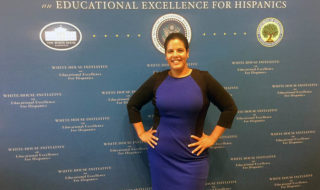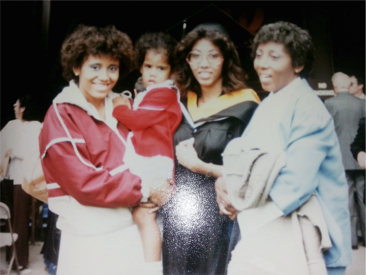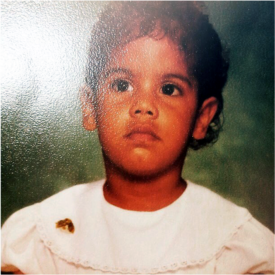Dania Matos will ‘lead with love’ as Berkeley’s new head of equity, inclusion
“We're the number one public research university. We should be leading in this, too,” new administrator says
July 2, 2021

Dania Matos will be UC Berkeley’s new head of equity and inclusion. She said her work is “about perpetuating beauty in the center of injustice.” (Photo courtesy Dania Matos)
UC Berkeley’s new vice chancellor for equity and inclusion wants the top public university to be “a place where people feel that their humanity is affirmed and that they develop as transformative practitioners — a place that they’re proud to be a part of.”
Dania Matos (she/her/ella), who is currently the University of California, Merced’s first associate chancellor and chief diversity officer, will take on the top administrative role on Aug. 16, Chancellor Carol Christ announced today (Friday, July 2).
Her portfolio will include some of UC Berkeley’s most pressing priorities, including pushing to make Berkeley a certified Hispanic Serving Institution and creating a campus environment where every Berkeleyan can thrive.
“Honoring the ideals of diversity, equity, inclusion, belonging and justice is about perpetuating beauty in the center of injustice,” Matos said in an interview with Berkeley News. “To do that we must confront our enduring legacy of slavery and the structural inequities that founded this nation with actionable solutions that lead to transformative change.”
“We’re the number one public research university,” she added. “We need to be leading in this, too, not just as an end goal, but in how we show up for ourselves and each other.”
In a message to the campus community, Christ said, “at this unique moment in time, the role of the vice chancellor for equity and inclusion could not be more important for our campus.”
“I am confident Dania will provide the leadership and vision we need to rebuild community, provide a true sense of belonging for all, and advance the essential fight against hatred, bias and discrimination,” Christ said.
Matos will take over as vice chancellor for equity and inclusion from Oscar Dubón, Jr., who stepped down at the end of June after four years in the role. Sharon Inkelas is serving on an interim basis until Matos arrives on campus.

Matos has lead equity and inclusion work for the last decade. She visited the White House to represent Latinas Leading Tomorrow, a Virginia nonprofit. (Photo courtesy Dania Matos)
Over the last decade, Matos has led equity and inclusion work spanning the private, nonprofit and government sectors. Prior to leading UC Merced’s diversity efforts, Matos was the inaugural deputy chief diversity officer at the College of William and Mary in Williamsburg, Virginia. She also served in the public defender’s office in Virginia, where she saw first-hand how the criminal justice system harmed underrepresented communities.
In July 2019, Matos created UC Merced’s first Office of Equity, Diversity and Inclusion. Over her three years of leadership, she has conceived and orchestrated a number of impressive initiatives during an unprecedented time, said Chancellor Juan Sánchez Muñoz.
“Despite the past year’s pandemic, Dania has left a significant mark at the university, not only setting standards and expectations at a high level but championing our People First and Valuing Black Lives projects,” said Muñoz. “She touched every aspect of our work, and we will miss her thoughtful counsel.”
Matos said coming to Berkeley is a “dream come true” and said she aims to be an actionable and collaborative campus partner who “leads with love.”
“We often talk about the personal becoming the professional, and the professional being personal. And it truly is,” Matos said. “When I think about this work, it’s really embedded into who I am and not just what I do.”
“There’s a saying that says ‘I make my ancestors proud.’ I always think that one day, we’re going to be someone’s ancestors, and I want them to be proud of what I did and what I stood up for and what I created and what I impacted,” she added. “And so that centers who I am and how I approach this work.”
‘Coming from a place of knowing’

Matos, in the arms of her mother, and her grandmother watched her aunt graduate from Rensselaer Polytechnic Institute in Troy, NY. Education, both inside and outside the classroom, can be “transformative.” Matos said. (Photo courtesy Dania Matos)
The oldest of three siblings, Matos spent her early years in Florida after her mother arrived from Puerto Rico to finish her degree at the University of Miami and be an example to her young daughter.
“It is a lesson of resilience and the transformative power of education, both inside and outside of the classroom, that I carry with me to this day,” Matos said.
At an early age, Matos, a Black Latina, said that her mother ensured she knew she was “inheriting a struggle” and that she “had a responsibility to do something about the world she was inheriting.”
“Throughout her life, she shared that she has navigated spaces of ‘having’ and ‘not having’ when it comes to socioeconomic status,” Matos said.
Despite those challenges, Matos said her mother always sacrificed to ensure her children could get the best education possible.

Matos and her mother on the Brown campus. At Brown, Matos found herself navigating unfamiliar spaces of privilege and wealth. (Photo courtesy Dania Matos)
When Matos arrived at Brown University, where she studied international relations with a focus on politics, culture and identity, she found herself navigating unfamiliar spaces of privilege and wealth. Matos credits Brown with giving her the language and theory to not only understand her experiences but also understand how systemic oppression and institutional policies and practices can influence an individual student’s experience.
“At first, I had a feeling like I didn’t belong, and had someone try to tell me that I got into the university because of affirmative action, and that I shouldn’t be there,” she said. “So, in the work I do now, I’m coming from a place of knowing, versus just understanding. And I think that can be really powerful, because I’ve been there and now have the privilege of tackling those complex issues and creating solutions to address them.”
In preparation for her work at Berkeley, Matos said she is delving into the campus’s quantitative and qualitative data and asking questions like: What does belonging at Berkeley mean? What happens when belonging fails? How can she be an administrator of joy and beauty on campus?
“One of my favorite poet-activists is Maya Angelou. And she has the famous quote: ‘People will forget what you said. People will forget what you did, but they’ll never forget how you made them feel,’” Matos said. “My hope is that people feel like Berkeley was a place that mattered to them and where they mattered.”
‘Shifting the air’
Matos joins Berkeley as students, staff and faculty are coming back to a campus that, according to a recent campus climate survey, is still not a welcoming environment for many Berkeleyans from underrepresented and marginalized communities.
While the data is one part of the story, Matos said it does not always give a full picture of what is happening.

At a young age, Matos’ mother told her she was “inheriting a struggle” and “had a responsibility to do something about the world she was inheriting.” (Photo courtesy Dania Matos)
“While it’s important to have data, often data doesn’t accurately depict the entire campus community correctly,” said Matos. “So, how do we ensure everyone matters in our own way and in our own space? Perhaps it’s augmenting something that is already working on campus, while asking questions in other areas that cause the air to shift.”
Among the initiatives Matos wants to bring to Berkeley is a formal and informal listening tour to understand and document the stories and experiences that are often lost in aggregated data surveys.
Matos also hopes to expand and create more spaces for people to build community, whether that is making herself more accessible through drop-in office hours, or creating more events and groups that will “build belonging” at Berkeley.
“I am a hit-the-ground, roll-my-sleeves-up, type of leader,” said Matos. “I think that you need to connect with people where they are. It’s going to be a tall order, but I bought some flats and I’m ready for that challenge.”
Through those interactions, Matos will gauge how to create her expanded vision for what diversity, equity, inclusion, belonging and justice will look like at Berkeley.
She also hopes to build community with the force of student, faculty and staff ambassadors across campus departments, divisions, offices and colleges who will promote inclusion and help to diversify staff and faculty leadership.
Matos also noted that some of the campus community will be returning to an entirely new environment of hybrid work and online learning. Students, staff and faculty will need space to adjust and process the traumas of the pandemic and our continued reckoning with systemic injustices.
“It’s not the Berkeley of March 2020. What matters and what we value has maybe shifted for some of us,” said Matos. “And so, it’s thinking about how do we give grace to what people may be enduring? How do we tend to the mental and emotional health needs around wellness? How do we ensure and honor the flexibility and grace for people to retain what works for them and their agency?”
Most importantly, Matos said she hopes to come to Berkeley to build a place that centers community with a “transformative love” that honors everyone.
“We may try new things, we may take some risks — and we may fail,” she said. “But it’s about being transparent, identifying where we were wrong, admitting our faults, and finding ways to rise and honor the dignity in all of us.”